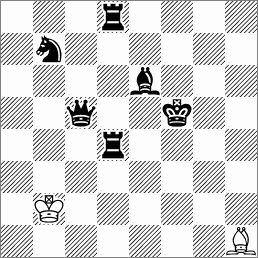Lubomir Kavalek wrote shortly about Johann Sehwers in the "Washington Post", August 24, 2009: he "was a prominent linguist and literary historian. "Endspielstudien," a collection of his 64 endgame studies, was published in Germany in 1922.".
More information about Sehwers and other Latvian composers from Riga around 1900 can be found in Alain Pallier's article "Herman Mattison (Hermanis Matisons, 28xii 1894-16xi 1932)" in EG 185, July 2011, pp 215-219. Johann Sehwers was a renowned philologist. His field of research was the influence of German language in Latvian.
Some of his studies can be found, with enjoyable comments by John Beasley and further biographical details, in BESN Special number 49.
This is a good stalemate study, while the following endgame study deals with a different theme:
Show Solution
Παντελής Μαρτούδης (28-06-1925 - 04-07-2004) Cyprian composer (Pantelis Martoudis)
Pantelis Martoudis was initiated in chess composition by Byron Zappas in Cyprus and moved to Greece in the late 1970s. He was specialized in helpmates in three moves with cyclic white play. His obituary by Harry Fougiaxis gives more information and presents 9 problems of his.
Let's quote a h#3 which was not presented on that webpage:
Show Solution
Анатолий В. Караманиц (28-06-1950) Ukrainian composer and FIDE Master (Anatoly Karamanits)
 |
| Anatoly Karamanits [popovgl.narod.ru] |
Anatoly Karamanits composes moremovers and helpmates.
Караманіц, Анатолій Вікторович
The Problemist, 2003 (H2643)
3rd Prize

The diagram position is not for solving. Only the positions after the twins must be solved.The Problemist, 2003 (H2643)
3rd Prize
| h#6.5 | Zeroposition a) bSb7->b4 b) bSb7->b3 c) bRd8->e3 | 2 + 6 |
Show Solution

No comments:
Post a Comment